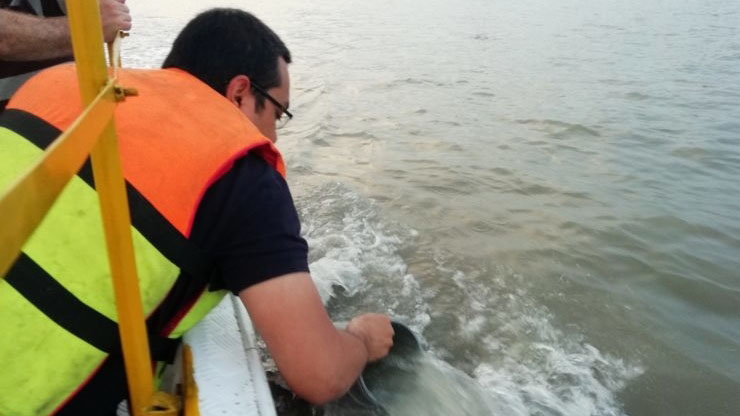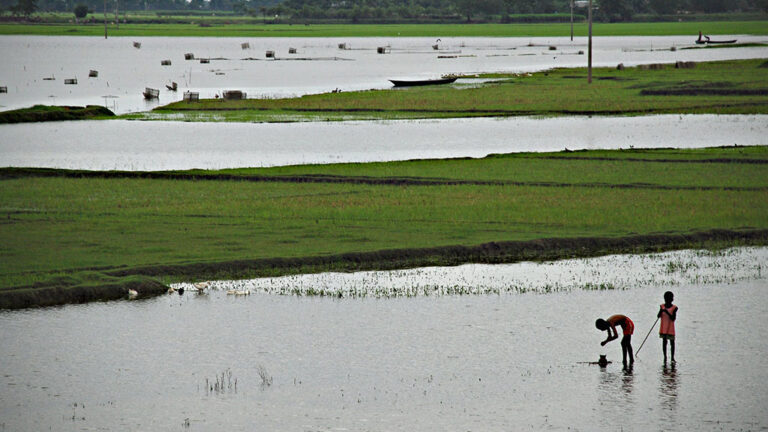The Netherlands has long worked to build dikes and ditches as protection against water. Knowledge exchange between the Netherlands and Bangladesh means that similar challenges can be tackled in a sustainable way, both now and in the future. Utvecklingsmagasinet met two researchers at Utrecht University.
"God created the world, but the Dutch created the Netherlands." This is one of the most famous sayings in the Netherlands. At the same time, it is also a saying that has symbolized how Dutch engineering has long fought against the elements. Now the knowledge is exported to Bangladesh through a research project, but in what way is it relevant to the Netherlands? And the rest of the world?
The Netherlands is a densely populated country, about 17 times as densely populated as Sweden, but would have been even tighter if it were not for polders. Polders are artificial land areas created by building embankments against the sea and pumping large bodies of water. The former seabed then provides fertile cultivation areas.
Far from the Netherlands - in Bangladesh - the same technology has been used to increase agricultural yields. However, over-utilization of agricultural land and large-scale irrigation of the area have had many consequences. Groundwater levels have been affected and, among other things, caused the surrounding land to be filled with water, which has drastically reduced the harvest from agriculture.
Through a collaboration between the Netherlands and Bangladesh, a research project was started in 2016, Living Polders, which will run until 2021. The project aims to develop methods for managing the polders in a sustainable way.
I meet Frank van Laerhoven, PhD at Utrecht University and project manager for Living Polders, at his office in Utrecht. He talks about the historical significance of the polders for the Netherlands and the origins of the cooperation between the two countries.
- We have been building the ditches for 500 years. The Netherlands is a large delta and we know water issues, so there were incentives to export the knowledge. Research is created by opportunity and this particular project was stimulated by Dutch authorities.

As the extraction of groundwater has increased, the ground level has also fallen. At the same time, the rising sea level is something that will further aggravate the situation in the delta. Researchers have pointed out that large parts of Bangladesh may be under water in the future, which makes measures even more urgent.
Although this project is believed to have potential, other projects have had difficulties. On Skype, I get in touch with Feroz Islam, a doctoral student and researcher from Bangladesh, who talks about how previous initiatives have encountered obstacles.
- Our team has talked to the locals who have felt that they have not become sufficiently involved in the government's work to plan and construct polders. In the beginning, it worked well, but landowners did not feel involved or sufficiently compensated for the land masses and agriculture they lost. This made the residents disappointed, protesting and ultimately making it more difficult for the government to carry out the work.
Why export knowledge?
Why then have the Dutch authorities become involved in the management of water resources in Bangladesh? The project has an explicit goal to offer business opportunities for the Dutch water sector. In addition, the research results are believed to be applicable elsewhere in the world. Islam mentions the Mekong Delta in Vietnam, van Laerhoven mentions the Mississippi Delta in the United States. Both mention the Netherlands as a country that in the future will need to adapt its management of water resources to the changing climate.
- This situation is not unique to Bangladesh. Bangladeshis are not the only ones using this type of solution. Many other deltas in the world have the same type of problem due to sea level rise, so this is nothing unique. The Netherlands is just another example of this, says Feroz Islam.
Frank van Laerhoven is in the same line, but also raises a warning finger.
- Wherever there are polders, there are problems similar to these, but I doubt how much we can do it (apply the knowledge elsewhere, editor's note). We may have been a little too optimistic about that goal.

There therefore seem to be opportunities to transfer the knowledge from the project in Bangladesh to other parts of the world. What does Feroz Islam think will then be the most difficult questions to solve?
- The problems are often about how different interests are involved. I believe that if we can solve it in a constructive way, the knowledge we get here can be used anywhere in the world. What you need to keep in mind is that interests look different everywhere. For example, farmers in the Netherlands are very strong. You can not just tell the farmers to flood their land for a few years and that they have to move.
The future is uncertain but bright
The example from Bangladesh shows that it is not completely frictionless to run climate adaptation projects, not least because of the economic consequences that can affect the local population. In addition to this, the solutions seem to need to be tailored to each village, town or country in which they are implemented. There are absolute difficulties, but Feroz Islam looks to the future with confidence.
- What surprised me most is how people adapt to the situation they are in. You are surprised when you see the solutions locals have come up with themselves, even if they have limited access to technology and knowledge. I believe that this ability to adapt is universal, it exists throughout the world.
The project is still rolling on. Bangladesh continues to work with the polders in real time, while the Netherlands steels itself and prepares for the future.


